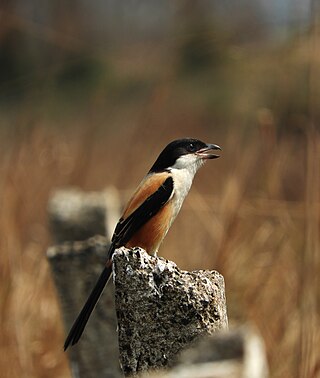
The long-tailed shrike or rufous-backed shrike is a member of the bird family Laniidae, the shrikes. They are found widely distributed across Asia and there are variations in plumage across the range. The species ranges across much of Asia, both on the mainland and the eastern archipelagos. The eastern or Himalayan subspecies, L. s. tricolor, is sometimes called the black-headed shrike. Although there are considerable differences in plumage among the subspecies, they all have a long and narrow black tail, have a black mask and forehead, rufous rump and flanks and a small white patch on the shoulder. It is considered to form a superspecies with the grey-backed shrike which breeds on the Tibetan Plateau.
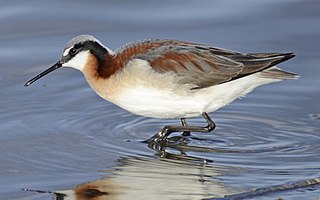
Wilson's phalarope is a small wader. This bird, the largest of the phalaropes, breeds in the prairies of North America in western Canada and the western United States. It is migratory, wintering in inland salt lakes near the Andes in Argentina. They are passage migrants through Central America around March/April and again during September/October. The species is a rare vagrant to western Europe.

The tricolored heron, formerly known as the Louisiana heron, is a small species of heron native to coastal parts of the Americas. The species is more solitary than other species of heron in the Americas and eats a diet consisting mostly of small fish.

Viola tricolor is a common European wild flower, growing as an annual or short-lived perennial. The species is also known as wild pansy, Johnny Jump up, heartsease, heart's ease, heart's delight, tickle-my-fancy, Jack-jump-up-and-kiss-me, come-and-cuddle-me, three faces in a hood, love-in-idleness, and pink of my john.
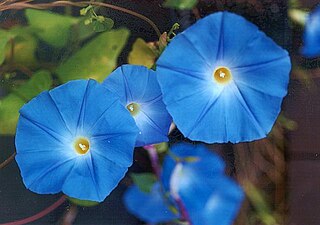
Ipomoea tricolor, the Mexican morning glory or just morning glory, is a species of flowering plant in the family Convolvulaceae, native to the tropics of the Americas, and widely cultivated and naturalised elsewhere.
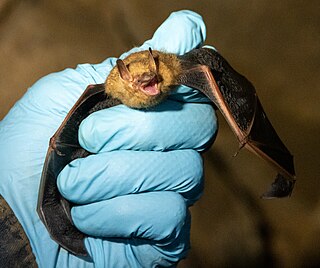
The tricolored bat is a species of microbat native to eastern North America. Formerly known as the eastern pipistrelle, based on the incorrect belief that it was closely related to European Pipistrellus species, the closest known relative of the tricolored bat is now recognized as the canyon bat. Its common name "tricolored bat" derives from the coloration of the hairs on its back, which have three distinct color bands. It is the smallest bat species in the eastern and midwestern US, with individuals weighing only 4.6–7.9 g (0.16–0.28 oz). This species mates in the fall before hibernation, though due to sperm storage, females do not become pregnant until the spring. Young are born helpless, though rapidly develop, flying and foraging for themselves by four weeks old. It has a relatively long lifespan, and can live nearly fifteen years.

The tricolored blackbird is a passerine bird of the family Icteridae. Its range is limited to the coastal areas of the Pacific coast of North America, from Northern California in the U.S., to upper Baja California in Mexico.
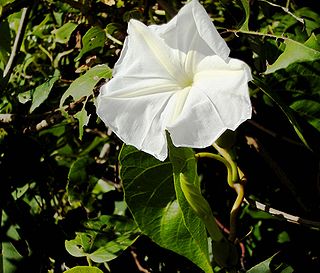
Ipomoea violacea is a perennial species of Ipomoea that occurs throughout the world with the exception of the European continent. It is most commonly called beach moonflower or sea moonflower as the flowers open at night.
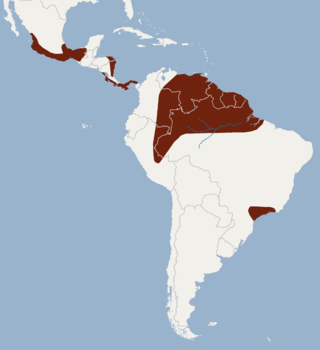
The tricolored big-eared bat is a bat species from South and Central America.
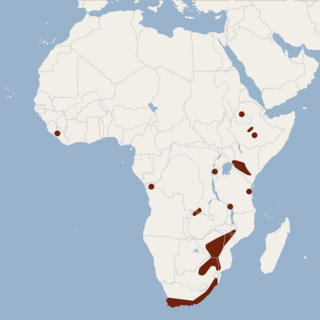
The Cape hairy bat, also known as little brown bat, Temminck's mouse-eared bat, Cape myotis, tricoloured mouse-eared bat, Cape hairy myotis, Temminck's hairy bat and three-coloured bat is a species of vesper bat that is found in Sub-Saharan Africa.
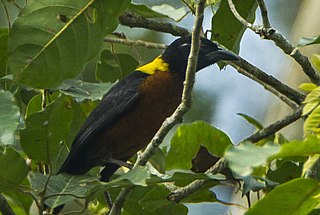
The yellow-mantled weaver is a species of bird in the family Ploceidae. It is sparsely distributed across the African tropical rainforest.
Inocybe tricolor is a rare member of the genus Inocybe that is widely distributed in temperate forests. It is a small mycorrhizal mushroom that contains the hallucinogens psilocybin and psilocin. Inocybe tricolor is found under Norway spruce in central Europe.

The dark-capped bulbul is a member of the bulbul family of passerine birds. It is found in central, eastern and south-eastern Africa.

The banded snail sucker is a species of snake of the family Colubridae.
Tropidodipsas fischeri, Fischer's snail-eating snake, is a species of snake in the family, Colubridae. It is found in Mexico, Guatemala, El Salvador, and Honduras.
Tropidodipsas guerreroensis, the Guerrero snail sucker, is a species of snake in the family, Colubridae. It is found in Mexico.
Tropidodipsas papavericola, the poppyfield snail sucker, is a species of snake in the family, Colubridae. It is found in Mexico.
Tropidodipsas philippii, Philippi's snail-eating snake, is a species of snake in the family, Colubridae. It is found in Mexico.
Tropidodipsas repleta is a species of snake in the family, Colubridae. It is found in Mexico.
Tropidodipsas zweifeli, Zweifel's snail-eating snake, is a species of snake in the family, Colubridae. It is found in Mexico.












